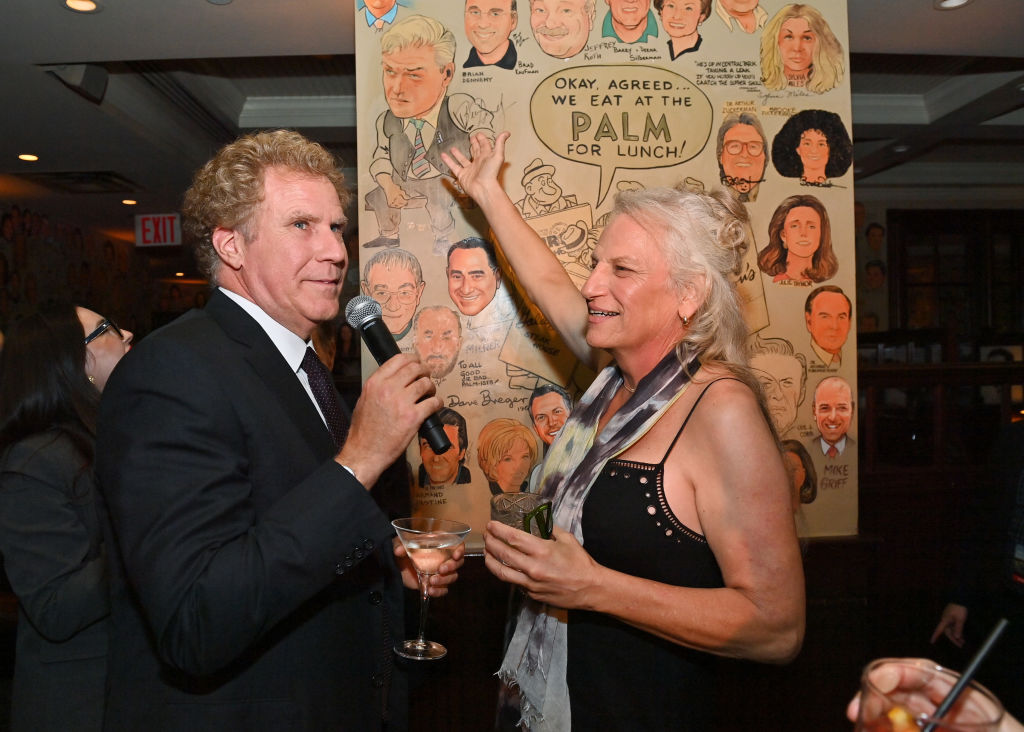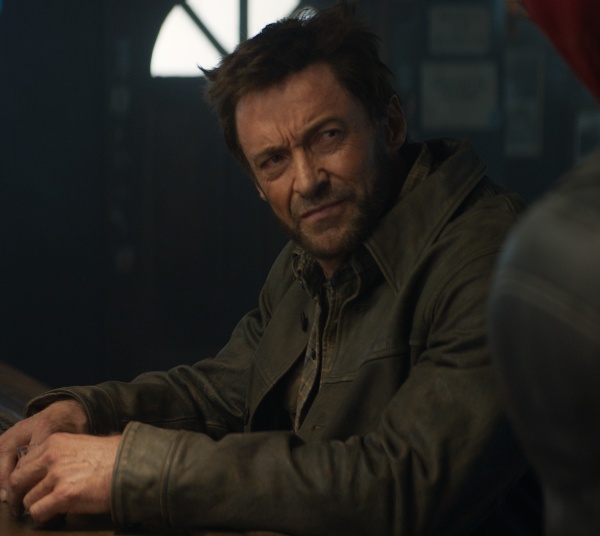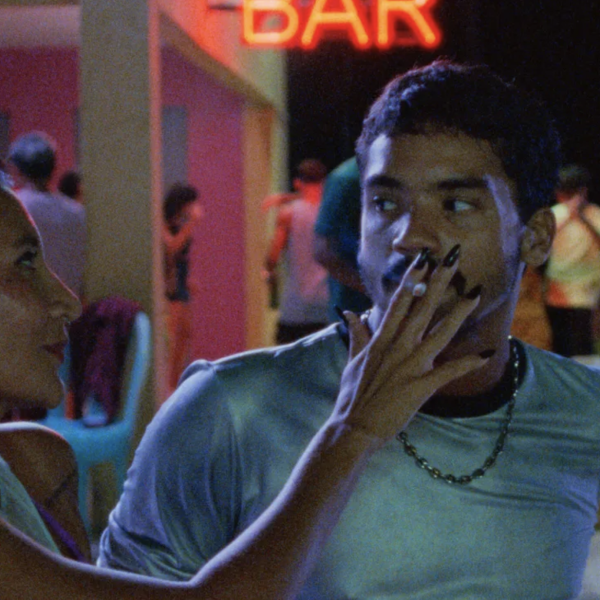Years ago, Will Ferrell read the same email that Harper Steele sent to all her friends informing them that she had transitioned. But Ferrell, after talking to his old “Saturday Night Live” writer pal about her big news, had a novel idea: Why not take a road trip with a documentary filmmaker (Josh Greenbaum) across the country to revisit some of Steele’s old haunts? It would be an opportunity to ask and answer a lot of questions, and check out the temperature of the country.
That experiment became the Sundance breakout “Will & Harper” (now streaming on Netflix), which is playing well for the documentary branch of the Academy. Yes, some voters may be allergic to the recent spate of “celebrity docs,” but this is far from the usual hagiographic portrayal. We get a look at the real Ferrell in a way we never have before (crying, for one thing), and we get to know the charismatic and vulnerable Steele.
I sat down with the old chums on Zoom, where we took our own trip through the world of “Will & Harper.”
The following interview has been edited and condensed for clarity.
Anne Thompson: This movie got to me. It moved me. It made me happy. It made me laugh. It was better than I was expecting.
Harper Steele: We’ll take it.
Harper, you sent out that email, and you get various reactions to it. What was the road from the email to the documentary?
Steele: Just as a condition of coming out, one of the things that I wanted to do was to go see all my friends. It was also the tail end of the pandemic, and we weren’t seeing each other a lot, and finally, after a long break, I got a chance to sit down with Will in his backyard. We had spoken, but we hadn’t seen each other for so long.
And Will, having known that I’m a road trip person, just thought it might be a fun thing to do, which is how we generally bounce ideas off of each other. We’re always trying to make stuff, whatever it is, good or bad; it came naturally. I didn’t say ‘yes’ at first, because I don’t like being on camera, but if you watch the documentary, it turns out I am on camera a lot.
The banter between the two of you is priceless. First of all, you’re both naturally funny. You know how to get a laugh. But what gave you the idea of the documented road trip?
Will Ferrell: Harper’s heading on her email that she sent out, the subject line was, “Here’s a weird one,” which is classic Harper Steele. And then you read this — it stops you in your tracks — announcement of the next chapter of her life. It was almost like, back to my friend, “Hey, here’s a weird one, right back at you. What if we go on the road?”
I’d never taken a cross country road trip. And I know Harper was lamenting the fact that as a trans woman, she was thinking, “Gosh, now I have to think twice about some of the places I never would have thought twice about in previous days.” And I thought, “Well, that could be an opportunity. What if I’m your chaperone into these places, and it hopefully would provide you with a degree of safety and support at the same time, it’ll allow me to ask all these questions I have about what you’re going through now and what it means to be trans and how long it took you to to figure out if you were going to come out and and just educate myself.”
I just pitched it to her and fully expecting her to say no, which she did initially. I also wanted to make it clear to her that I wasn’t trying to exploit our friendship. I just literally thought, as Harper said, we just like to do weird, fun things. This could this be another one of those, not really thinking at that point of any sort of ramifications down the line, positive or negative. And she eventually came around to it, and here we are.
Harper, why did you decide to go for it?
Steele: There’s a couple of reasons. One of them is, again, Will and I’ve done a lot of odd projects. We’ve done a couple of straight down the middle projects, but mainly odd projects. That’s the side of humor that we connect on. And this felt like, “Yeah, why not? This is weird. I want to do this. This is strange. It’s something I wouldn’t do.”
We both like to hold our hands over the comedy flame as long as we can. There’s something about doing something strange that we like. That’s why I did beer commercials with him in the Midwest where neither of us made any money. So it was just fun, weird things to do.
But then also, definitely the trans landscape, the bills that were being introduced to all the legislation around the country, started to creep on up on me. I was reading about that a lot, and I thought, “Will didn’t want to turn our friendship into an opportunity, but I did want to turn my friendship into an opportunity. I have this unbelievable vector for all kinds of people to see a trans experience.” And so, yeah, I decided after that.
On Netflix, so many people get to see it.
Steele: That was one of the reasons why we wanted to do Netflix. That audience is just so large.
How did you pick a filmmaker to go with you on this journey? How many people were literally involved in this? There’s you two in the car. I’m curious about the logistics. You’re driving, right?
Steele: We drove. They had two cameras, for the most part, mounted on the hood. We didn’t really interact with the camera crew that much. Josh, the director, who is a friend of both of ours, told us on day two or three that we would forget the cameras were there, which we didn’t believe, but it turned out to be true. It almost felt like going across the country with Will alone.
Ferrell: There was our DP. There were two operators and a sound person and Josh in a support vehicle that would stay in front of the car and and we had a walkie talkie in the car. There was little interaction other than Josh would remind each one of us. We created a document, a list of questions we both had for each other, and Josh had access to that so he occasionally would go, “You might maybe ask Harper about this,” and get us back on track — if we had spent an hour calling personal injury lawyers on billboards in Indiana.
Steele: Which we did.

Ferrell: It was a small footprint and for the most part, we did feel like we were alone.
You were making jokes and being presentational in various situations, but Will, you end up being emotional and vulnerable. Did you expect that to happen to the extent that it did?
Ferrell: I had a feeling it would, but not to the extent. What was so beautiful about the experience for me was to feel safe enough with my friend to actually go to those places, and for us to have those conversations. And as hard as it is for Harper to be on camera, as she’s not used to it, I’m not used to being just myself, right? That was my job. Just sit back, be yourself. Don’t try to do a bit, don’t try to do a character.
Steele: No, you’re yourself, not Robin Williams.
Ferrell: I wanted to sit back and listen, and it’s about her, it’s about my friend.
Steele: I honestly thought I couldn’t get Will to cry. Because Will is, for lack of a better word, a stiff board of non-emotion, except when he’s acting, he can act pretty well. I was actually a little more surprised. Like, ‘wait, how am I going to handle this? I’ve never seen this person be this emotional.’ So it was sweet.
Also the moment that killed me is when you went to your sister, and you find out that she was happy to have a sister.But she also articulates that you went through a lot of pain.
Ferrell: She felt for you on that. And it’s not Harper’s intention at all for us to feel that. But you care. I don’t know if it’s rational. You carry a little bit of guilt of like, “Oh, God, I wish I could have helped my friend earlier on. I wish I could have been there.” And yet, it is what it is.
She says it all the time. Each journey is different, and you choose to transition when it feels right for you, when you finally can get to that place. A lot of factors come into play. But yeah, you feel this sorrow for her, for not being who she was always meant to be for so long, right?

And you couldn’t possibly know about it. Harper, you were trepidatious about going into some of those bar rooms and pool halls and yet, people didn’t seem to deliver on your fears. They behaved better than you expected?
Steele: Well, there’s a caveat there. It’s not me alone, it’s me with one of the most beloved comedy actors in the world and and a camera crew. So I do like to point out that not everyone’s experience as a trans person crossing the country is going to be this effortless or this friendly. I had a friendly force field around me the whole time. I can tell when people are being authentic. I’m not a dummy. I’ve been on the planet for a long time, and I do walk into these places with a bit of a projected fear, and I was happy to see that I was wrong in those projections.
Harper, was shooting this film therapeutic? Was it fun? Was it upsetting?
Steele: Therapeutic? Maybe a little bit. That’s probably more for me and my therapist. But fun, absolutely it was. The whole thing was joyous. Even the emotional parts. Sometimes crying, which I’ve discovered quite a lot, can be super powerful and enriching and wonderful, to have feelings. In that respect, the trip was so fulfilling.
What was the high point of the trip for each of you?
Steele: For me, it was being with my sister. I’d stopped by Iowa City before that, but I could be there with my friend Will to sit there and talk to her. That was very special for me.
Ferrell: Even though it’s super early on, I so enjoyed our breakfast with Harper’s kids and just listening to how funny they are, and insightful and yet concerned about Harper and how well they know her.
Did either of you get in the editing room?
Steele: No, we were the subjects of a documentary. Neither one of us has that skill set, that is not how we work. I will write something, or we’ll write something and perform it. And the idea of sitting with 250 hours of footage and trying to make something out of it, forget it!
What did you think when you first saw the film?
Ferrell: The first time Josh sat us down to watch it, he was very nervous. And we both were like, “I don’t know how you did it. How did you make this movie? How did you keep the humor going? How did you keep the heart?” The music is wonderful. We had a few little notes here and there, but we were dumbstruck that it seemed like it worked.
Harper, going forward, what are you working on?
Steele: I’m a writer, so that’s what I do. I have just come off of working on a Netflix show, a comedy room throughout the summer, and that’s coming to an end, so I’ll probably pick up a script that I halfway finished and start writing and keep going. I’ve been doing that for 30 years at least, so I don’t know anything other, any other way to be.
“Will & Harper” is now streaming on Netflix.






